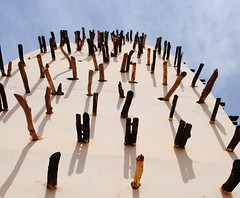Time had passed us by faster than we had realised, it was the 2nd November and as we opened our eyes to the same grotty walls of our hostel room we contemplated another day of waiting and searching for a lift through Mauritania before our visas expired. Our bikes sat unloved in the garage while we pined for them as we began our daily round of asking truck drivers if they were Nouakchott bound. Lunchtime came and went and our spirits were sinking, we had been informed that owing to a major lamb festival (and national holiday) that was nearing no sane minded truck driver was going to get himself stranded from his family in Mauritania. Finding it difficult to argue with the ‘not wanting to miss the party’ logic we began to consider other options. But luck was on our side…
We spotted the beautifully painted trucks of Lise and Tony from a distance, we had met them in El Aaiun (Western Sahara). What we couldn’t communicate via the blog was that our French friends had organised to be smuggled into a nearby camp of Sahrawis (‘refugee’ camps in Western Sahara are tightly controlled by the Moroccan military).
Tony and Lise were in trouble, whilst their time at the camp had been immensely constructive, the material they had filmed had hit the French and Spanish press along with their names. The police, gendarmarie (special police) and military had now been following them since they left the camp, so they were even more pressed than us to reach Mauritania. By the time we met with them we were at the border and it only took our acquaintance to ignite problems with the police. Though we had finished all the border formalities and had our passports returned the police confiscated them and began to question us on our relationship with the French.
A 14 year-old boy had been murdered in the camp, shot dead by the Moroccan forces. The achievement of our friends and the risk they had accepted in circulating evidence was huge. When you see such injustice, it leaves a bitter taste in your mouth, so we knew we had to do whatever we could to help our friends. So as their vans were meticulously searched, we made out to be happy-go-lucky tourists who simply adored the jokes of the police.
After what felt like an eternity of waiting in the sun we were reluctantly given our passports and together we crossed into the stretch of no-mans-land, which was ironically quite a relief. We passed the sand piste and its famous land mined surroundings without a problem and made our way through the bureaucracy of the Mauritanian side. But a few hours later, it was all over and as the heat of the desert cooled to welcome us the evening closed in while we pitched our tent in Nouadhibou.
 Now after some sweaty driving time in the breath taking scenery of the Mauritanian desert we have taken a day off the road in Nouakchott the capital city. Here we are enjoying the hospitality of the Association de Development et de Promotion des Droits de l’Hommes (Association of Development and Promotion of Human Rights) who today took us to a human rights conference of all the countries of the Maghreb region. There is so much we would like to write about the conference today but we are so frustratingly limited by time!
Now after some sweaty driving time in the breath taking scenery of the Mauritanian desert we have taken a day off the road in Nouakchott the capital city. Here we are enjoying the hospitality of the Association de Development et de Promotion des Droits de l’Hommes (Association of Development and Promotion of Human Rights) who today took us to a human rights conference of all the countries of the Maghreb region. There is so much we would like to write about the conference today but we are so frustratingly limited by time!

Our stay here is too short, our visa has already expired and we must now leave whilst we can pass the border ‘in transit’ to avoid hitting enormous overstay taxes. There is so much more we could and eventually will get around to writing but for now we have a musical meeting in the city before we leave tomorrow for the border of Senegal at Rosso where we will cross the river Senegal and end our cycle break at long last!







